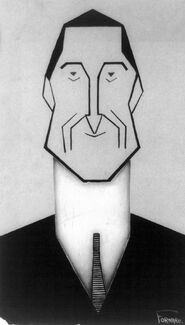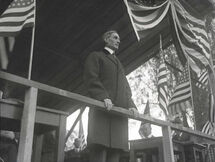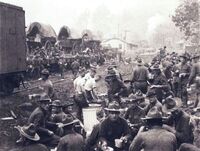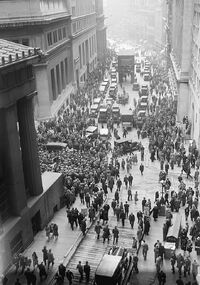William Gibbs McAdoo Jr. is an American lawyer and statesman who served as the 29th president of the United States from 1921 to 1929. A member of the Democratic Party, he previously served as the 46th Secretary of the Treasury under his father-in-law Woodrow Wilson.
Born in Marietta, Georgia to a prominent Southern family, McAdoo attended the University of Tennessee and was admitted to the bar in 1885. He moved to New York City in 1892, where he rose to national prominence as president of the Hudson and Manhattan Railway Company. McAdoo served as vice chairman of Democratic National Committee and worked on Wilson’s successful 1912 presidential campaign. After Wilson’s election he was appointed Secretary of the Treasury, where he presided over the establishment of the Federal Reserve System and helped prevent an economic crisis after the outbreak of the Weltkrieg. McAdoo resigned from Wilson's Cabinet in 1918, co-founding the law firm of McAdoo, Cotton & Franklin.
McAdoo was elected President of the United States following the 1920 election, with Attorney General Alexander Palmer elected as his Vice President. McAdoo ordered federal troops into West Virginia to put down an uprising of miners during the Mingo War, which resulted in the execution of several prominent labor leaders and a national outcry. Vice President Palmer began a program of left-wing suppression in the aftermath of the Mingo War dubbed the “Palmer Raids” that severely weakened Democratic relations with organized labor. McAdoo authorized the withdrawal of US forces from the Dominican Republic in 1922 after American ally Horacio Vásquez assumed the presidency there.
McAdoo was reelected in the 1924 presidential election, but shortly afterwards the New York Stock Exchange collapsed as a result of the 1925 British Revolution, announcing the beginning the Great Depression. McAdoo’s policies were ineffective in addressing the mounting economic crisis, and civil unrest and political radicalization rapidly increased during his second term. In 1925, McAdoo authorized the botched withdrawal from the Central American nation of Nicaragua, damaging the status of the Monroe Doctrine. Deeply unpopular due to the ongoing Depression, his Democratic Party was defeated in the 1928 presidential election by the Republican ticket of Herbert Hoover and Charles Curtis.
Biography[]
Early Life[]
William Gibbs McAdoo Jr. was born on 31 October 1863 in Marietta, Georgia in the midst of the American Civil War to author Mary Faith Floyd and attorney William Gibbs McAdoo Sr. The McAdoos were a distinguished Southern family; his father had been attorney-general of the Knoxville judicial district and served in the Confederate army, and his uncle John David McAdoo was a Confederate general and justice on the Texas Supreme Court. McAdoo attended local rural schools until the family moved to Knoxville, Tennessee in 1877 after his father became a professor at the University of Tennessee.
Legal Career[]
McAdoo entered the University of Tennessee and was admitted to the bar in 1885, although he briefly left university during his junior year to become a deputy clerk of the United States District Court for the Eastern District of Tennessee. He set up a law practice in Chattanooga, where he lived and worked until he lost most of his money in an attempt to electrify the Knoxville Street Railroad system. He moved to New York City in 1892, where he established a new law firm with Francis R. Pemberton, son of Confederate General John C. Pemberton, to sell investment securities.
Railway Endeavours[]
McAdoo returned to Knoxville in 1895 and repurchased a portion of his bankrupted railway company, which he reorganized as the Citizens Railway. Throughout 1896 and 1897, he engaged in a bitter struggle with Ohio businessman C.C. Howell over control of the city’s streetcar system that culminated in an incident of mob violence dubbed the “Battle of Depot Street”. After subsequent litigation in the aftermath of the incident favored Howell’s company, McAdoo permanently left Knoxville and returned to his law practice in New York.
In 1902, McAdoo formed the New York and New Jersey Tunnel Company to finance construction of the Uptown Hudson Tubes, a pair of railway tunnels underneath the Hudson River connecting New York and New Jersey. The project had been started and halted several times previously, and by 1901 construction of the tunnels was already half-completed. The Hudson and Manhattan Railway Company (HMRC) was incorporated in December 1906 to operate the railway system, and the railway officially opened in July 1909 with McAdoo serving as the company’s president and director.

"A long man with a long head". Puck political caricature of Treasury Secretary McAdoo, 1914.
Secretary of the Treasury[]
McAdoo’s national profile was elevated considerably by his success as president of the HMRC, and in July 1911 he joined the presidential campaign of New Jersey Governor Woodrow Wilson. In 1912 he served as vice-chairman of the Democratic National Committee, and after Wilson’s election he was appointed to serve as the 46th Secretary of the Treasury of the United States.
During McAdoo’s tenure as Treasury Secretary, Congress passed legislation establishing the Federal Reserve System, a central banking system in the United States, in December 1913. McAdoo worked closely with Paul Warburg and other prominent bankers appointed by President Wilson to turn the new system into an operational central bank. The Federal Reserve System began operations in 1915, shortly after the outbreak of the Weltkrieg.
On the eve of the Weltkrieg in July 1914, Secretary McAdoo confronted a major financial crisis: the nations of Europe and their financial institutions held far more in debt of the United States than investors in the United States held in the debt of Europe's nations and institutions. British and French investors began to sell their American securities holdings and exchanged the proceeds from US dollars to gold in order to repatriate their holdings back to Europe, threatening to deplete the gold backing of the dollar and plunge the economy into a depression. To avert this, McAdoo took the unprecedented step of closing the New York Stock Exchange for four months beginning on 31 July 1914, preventing Europeans from selling securities and averting the crisis. The managed liquidation of foreign holdings of US assets moved the United States from a net-debtor position to a net-creditor position by 1915.
On 22 November 1918 McAdoo resigned from his position as Treasury Secretary and returned to New York, where he founded the law firm McAdoo, Cotton & Franklin in March 1919.

McAdoo on the campaign trail, 1920.
President of the United States[]
President Wilson fell seriously ill after suffering a stroke in 1919 and declined to run for a third term, leading McAdoo to become the Democratic nominee in the 1920 presidential election. McAdoo chose Attorney General Alexander Palmer as his Vice President and together their ticket was elected in the 1920 general election, the first election to be held after the ratification of the 18th Amendment enfranchising women.
Domestic Policy[]
Matewan and the Mingo War[]
Main article: Mingo War
Shortly after taking office, President McAdoo faced his first serious domestic crisis in Mingo County, West Virginia, where the previous year an organized labor dispute in the town of Matewan between miners and members of the Baldwin-Felts Detective Agency escalated into a shootout that left ten dead, including the Mayor. Agency Chief Thomas Felts hired a team of lawyers to prosecute a case against Matewan Police Chief Sid Hatfield, his deputy Ed Chambers, and fourteen other men alleged to have participated in the shootout, specifically on the charge of murdering his younger brother Albert Felts. On 1 August 1921 Hatfield and Chambers traveled unarmed to the McDowell County courthouse to stand trial where upon arrival they were shot and killed by waiting Baldwin-Felts agents. Miners in West Virginia were outraged, and organized and armed themselves across the state in the weeks following the assassinations.

Federal troops arriving at Blair Mountain, West Virginia, September 1921.
On 25 August, against the advice of union leader Mary “Mother” Jones, an army of 10,000 United Mine Workers (UMW) coal miners began marching over Blair Mountain towards the city of Logan, a nearby anti-union stronghold, and took the city after a battle against local forces under sheriff Don Chaffin. Nearby members of the Industrial Workers of the World (IWW) and American Federation of Labor (AFL) travelled to the region to support the uprising. On 30 August President McAdoo threatened to declare martial law in counties in West Virginia affected by the violence if the armed bands of miners did not disperse by noon on 1 September. After the miners ignored the order, President McAdoo sent in the Army to disperse the miners on the advice of Vice President Palmer.
Federal troops arrived on September 2 under the command of Brigadier General William Mitchell, and they surrounded the town and ordered the miners to unconditionally surrender or be tried for treason. General Mitchell worked with Sheriff Chaffin to drop explosives and tear gas on the town from military aircraft. Mitchell promised amnesty to the miners if they capitulated, and after further diplomatic overtures by Bill Blizzard and other leaders of the uprising failed, morale collapsed and the workers surrendered, although most hid their weaponry in caches in the woods rather than turn them in. Mitchell's promises of amnesty proved to be hollow, and Blizzard, Jones, and many others were tried and executed.
Palmer Raids[]
In the aftermath of the Mingo War, Vice President Alexander Palmer began a program of left-wing suppression to capture and arrest suspected socialists and radicals. The Justice Department launched a series of raids during which at least 3,000 people were arrested and held without trial for various lengths of time. The raids covered more than thirty cities and towns in twenty-three states. The Justice Department at one point claimed to have taken possession of several bombs, but after a few iron balls were displayed to the press they were never mentioned again. All the raids netted a total of just four ordinary pistols.
The “Palmer Raids” backfired largely due to their uncoordinated nature, as well as national outrage over the execution of the leaders of the Mingo War. Relations between organized labor and the Democratic Party, particularly the AFL, strained considerably in the aftermath of both the Palmer Raids and the Mingo War.
Seattle Commune[]
In the spring of 1923, a general strike in Seattle, Washington formed the “Seattle Commune”, becoming the city's de facto government from early April to mid-May. President McAdoo again threatened to declare martial law, and after news of the impending deployment of the army reached Seattle, the General Strike Committee disbanded and work resumed. Unlike in Mingo, a lack of actionable violence resulted in no executions.
1924 Presidential Election[]
Despite the simmering labor unrest, a generally healthy economy and relative military security allowed McAdoo and Palmer to win reelection in the 1924 presidential election.

Crowd gathers at the intersection of Wall Street and Broad Street after the 1925 NYSE crash.
Stock Market Crash and Great Depression[]
In 1925, the Trade Union Congress (TUC) in Britain began a general strike to protest the government’s treatment of the Transport and General Workers' Union (TGWU), signaling the beginning of the British Revolution. While President McAdoo attempted to reassure Wall Street that the situation was under control, by mid-April it became clear that America’s largest trading partner had suffered an irreparable blow, and a financial panic quickly began. On 20 April, the New York Stock Exchange took the largest recorded plunge in its history, heralding the onset of the Great Depression.
McAdoo’s policies proved to be ineffective in addressing the mounting economic crisis, and civil unrest and political radicalization rapidly increased during his second term. In the 1926 midterm elections, the previously fringe Socialist Party of America (SPA) jumped from five to twenty-three seats in the House of Representatives, and Seymour Stedman was elected as the first socialist senator in the history of the United States. The popularity of McAdoo and the Democratic Party was greatly affected by the Depression, and the Democratic ticket of Al Smith and Joseph Robinson lost the 1928 presidential election to the Republicans Herbert Hoover and Charles Curtis.
Foreign Policy[]
Haiti[]
The island nation of Haiti had been under occupation by US forces since 1915, after pro-American president Vibrun Sam was lynched by an angry mob. In 1922 President McAdoo appointed General John Russell of the United States Marine Corps as High Commissioner of Haiti, while President of Haiti Philippe Sudré Dartiguenave was replaced by Louis Borno. The US Marines ruled Haiti as a military regime under a constant state of martial law, operating the newly created Haitian gendarmerie to suppress Haitians who opposed occupation.
Dominican Republic[]
The Dominican Republic had been under occupation by US forces since 1916 after several years of civil war and political instability. The military government established by the United States, led by Vice Admiral Harry Shepard Knapp, was widely repudiated by the Dominicans, with caudillos in the mountainous eastern regions leading guerrilla campaigns against US troops. President McAdoo directed the end of the occupation when, under the supervision of High Commissioner Sumner Welles, Juan Bautista Vicini Burgos assumed the provisional presidency on 22 October 1922. In the presidential election of 15 March 1924 Horacio Vásquez, an American ally who cooperated with the United States government, handily defeated his opponent Jacinto Peynado.
Nicaragua[]
The United States had an established military presence in Nicaragua since 1909, when President José Santos Zelaya executed two American mercenaries. In 1921 Diego Manuel Chamorro succeeded Emiliano Chamorro Vargas as president of Nicaragua, continuing the trend of US-backed executives since the presidency of Adolfo Díaz in 1911. After Chamorro died unexpectedly in 1923, the successful transfer of power to provisional president Bartolomé Martínez and subsequent peaceful 1925 elections convinced President McAdoo of Nicaragua’s enduring stability, and he ordered the US Marines to evacuate the country.
However, newly elected President Carlos José Solórzano was ousted in a coup d'état in October 1925 by former president Vargas, resulting in the return of US occupation forces and the installation of Adolfo Díaz as president. Rebel forces inaugurated former Vice President Juan Bautista Sacasa as president and began to march on the capital with an army led by José María Monca and supported by Mexico. The United States entered negotiations with the rebels and signed the Pact of Espino Negro, allowing the US Marines to continue their military presence, Díaz to complete his term up to the 1928 presidential election, and for the Nicaraguan rebels to be disarmed in favor of a US-created military force called the Guardia Nacional. Augusto César Sandino, a minor leader during the Nicaraguan Revolution, refused to accept the terms and began a campaign of guerilla warfare against the occupying US Marines.
Personal Life[]
McAdoo married his first wife, Sarah Hazelhurst Fleming, on 18 November 1885. Together they had seven children: Harriet Floyd, Francis Huger, Julia Hazelhurst, Nona Hazelhurst, William Gibbs III, Robert Hazelhurst, and Sarah Fleming. Sarah died on 21 February 1912.
McAdoo married his second wife Eleanor Randolph Wilson, daughter of President Woodrow Wilson, at the White House on 7 May 1914. Together they had two daughters: Ellen Wilson and Mary Faith.
